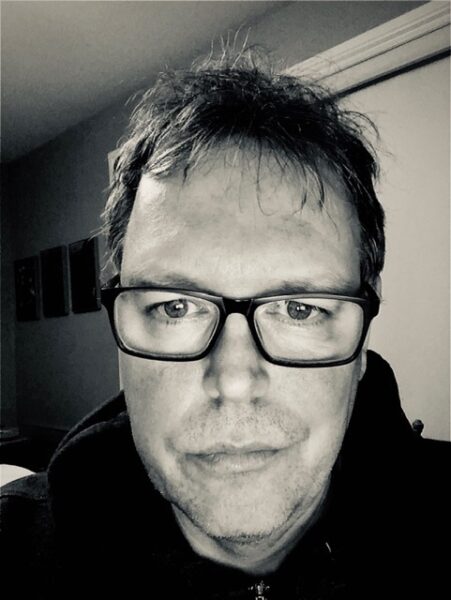
Since we still can’t gather together for meetings those who would have spoken at Media Club of Ottawa’s Fall meetings have agreed to do as our guest speakers did in the Spring after COVID-19 arrived in Canada. Each will write something for you to read.
If we could have held our October meeting at Ottawa City Hall, Christian McPherson would have spoken to us this evening about his career as an award winning writer and the difference between writing poetry and prose.
——————————————————————————Christian is a poet, novelist and cartoonist. He was born in Ottawa, Ontario in 1970. He is the author of 10 books, three novels, two collections of short stories and five books of poetry. Christian has a degree in philosophy from Carleton University and a computer programming diploma from Algonquin College. He is married to the beautiful Marty Carr. They have two kids, Molly and Henry. They all live together in Ottawa.
Christian’s new book is a double book of poetry entitled Walking on the Beaches of Temporal Candy. It is his 10th book and first hard cover. It was written over a period of about eight years. The publisher is At Bay Press, out of Winnipeg.
The launch for this book will be Saturday, November 14, 2020 on Zoom and it will be hosted by Ottawa’s own long-time CKCU radio host Susan Johnston.
Writing about the topic he would have spoken about Christian McPherson says the difference between writing poetry and prose is that “poetry is a quick jab, a punch to the face, whereas prose is a long, drawn out, sometimes exhausting fight. Sometimes you need to read one over the other. Sometimes you need to write one over the other.”
“Novels, for me”, he continued, “require planning — you are about to put up a skyscraper. A poem is like changing a light switch — but if you don’t know what you are doing it can kill you. Small doesn’t mean it is not powerful. A poem can change your life, make you see things in a new light. Short stories are like decorating a room — each one can be completely different, but if you have enough of them, you get a home (a book of short stories).”
He also wrote that as far as submitting to publishers, only certain publishers publish poetry; some only do prose; some do both. I have, in the past, submitted to many publishers. Now that I am a somewhat of an established writer, I have a few publishers I approach with a new book.
As for marketing, I try to promote all my books with as much enthusiasm as I can. Poetry, like crime, doesn’t pay. It doesn’t sell well. There is no money in it. Poetry is an act of love. Fiction, on the other hand, is the bread and butter of publishing. Novels sell, even better than short stories.
His response to my questions follow:
June: What did you start doing first – writing poetry or prose, or drawing?
Christian: I’ve been drawing cartoons since I was a kid. I’ve never done anything with my drawings in a professional way. I’m hoping to change this. As for writing, I did a little in high school but didn’t really begin writing until my late twenties. I was coming on thirty and didn’t like how my life was unfolding. I took stock of what I really wanted to do before I died — and wanted to write a screenplay. I love film. I should have devoted my life to it but I didn’t. That’s okay. I’ve done lots of other things I love and you can’t do everything. Anyway I had no idea how to write a screenplay and thought it was far too intimidating. I started with something small, a poem. I began submit to small magazines. I began to get published. I won the Ottawa Library Short Story contest back in 2000. When I did I thought, maybe I can do this. So when I had enough short stories for a book I submitted them to small Canadian publishers across the country. Nightwood Editions out of Gibsons, B.C. said yes and my first book of short stories, Six Ways to Sunday, was released in 2007. After that my first book of poetry came out of a press in Calgary, Bayeux Arts, Poems That Swim From My Brain Like Rats Leaving A Sinking Ship. Next was my first novel, The Cube People, which was based on my own life, fertility struggles with my wife and what it was like working for an IT shop in the federal government. It was a modest Ottawa hit. I wrote a sequel entitled Cube Squared. For my third novel, Saving Her, I wanted to write something other than funny novels all about government. Saving Her is a thriller written from the perspective of a woman. It’s dark and serious and the complete opposite of my other novels. I wrote the screenplay for Saving Her based on my novel. Nothing has become of the screenplay yet but I finally wrote what I set out to do fifteen years later.
June: Of the three, do you enjoy writing one genre more than the other?
Christian: I can’t say I like one more than the other. Novels are large commitments and they take (for me) years to put together. I am currently five years away from retirement from my job in the Federal Public Service. When I have more time, novels will be just as fun as anything else. I like creating things, whether it be poems, short stories, novels, cartoons or even LEGO sculptures, when I get into it — I get lost in these; happily so. It’s always about finding the time to create art.
June: Have you ever combined your writing and art?
Christian: Not yet. I’m hoping to do so. I thought about a book of poetry and drawings. I have also thought about doing a book of just drawings. I have a science fiction novel I’ve thought about writing for years; now I’m thinking it would make a great graphic novel. But I don’t know if I want to spend that much time drawing.Àa
June: Have you published a book of your cartoons? Or are you planning to do that?
Christian: I haven’t yet but would love to. I need my publisher to sign off and we will make it happen!
Thank you, Christian.
